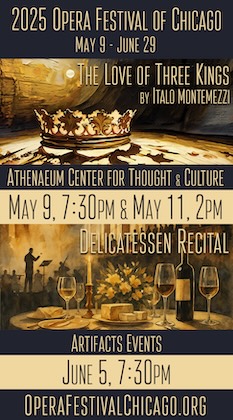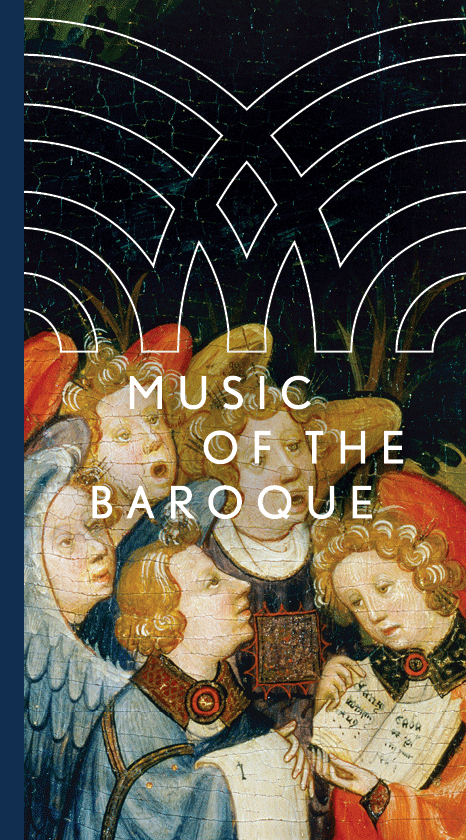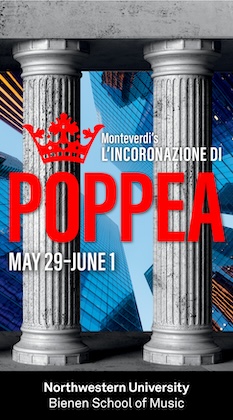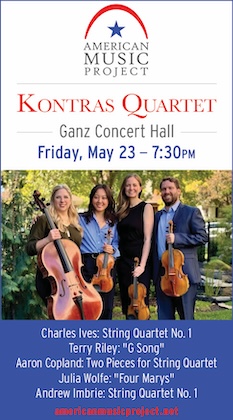Music Theater Works opens season with a lively “Pirates of Penzance”
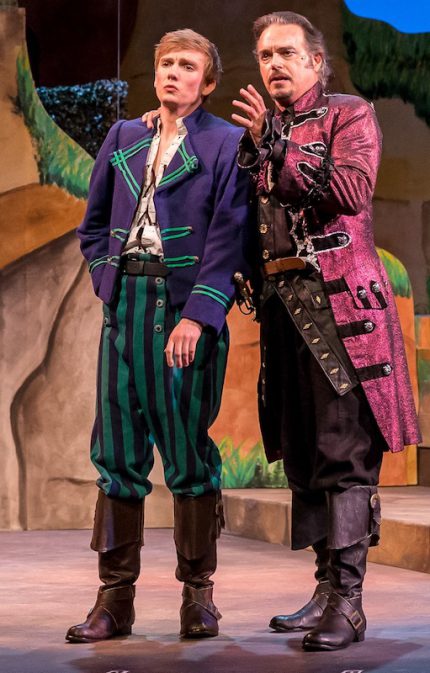
Once again Music Theater Works is kicking off its season with operetta. This year the company is reviving Gilbert & Sullivan’s The Pirates of Penzance, and the company’s first production of the G&S farce in a decade opened Saturday night at Cahn Auditorium in Evanston.
The Pirates of Penzance premiered in 1879–not in London but in New York. The motivation for W.S. Gilbert and Arthur Sullivan was to establish U.S. copyright for their new show and to combat the “pirated” performances of H.M.S Pinafore and other of their works that were being widely performed stateside without paying any royalties.
Hence, the inspiration of Pirates of Penzance. The story is typical of the duo’s genre in its cheerfully convoluted tale of Frederic, the young “pirate apprentice” orphan who is brought up by a band of kindly pirates. Frederic falls in love with Mabel, the beautiful daughter of Major-General Stanley amid a bevy of plot complications and assorted absurdities. Gilbert’s scenario is mere scaffolding for his skewering of the English class system, and Sullivan’s glorious score contains some of the team’s most celebrated music.
Music Theater Works was, of course, founded specifically for the underserved operetta genre by Philip Kraus and general manager Bridget McDonough (and until recently known as Light Opera Works). With the company’s long experience in presenting operetta, the current Pirates of Penzance got most of the important things right at Saturday’s opening.
Aided by a largely inspired cast, artistic director Rudy Hogenmiller served up a typically lively, fast-moving show. At times one wished he would take his foot off the gas pedal and give the vocal set pieces more room to breathe. One got the impression if a singer stands in place for more than a minute, the director fears that the show risks becoming boring. Fortunately, the one serious moment in the operetta, the duet “Ah, leave me not to pine”–the saddest music in all of Gilbert & Sullivan–was played straight without any comic stage business.
Gilbert’s piercingly witty libretto has to be understood if any G&S show is to succeed and Hogenmiller ensured that most of the large cast delivered the clarity and projection necessary to register Gilbert’s jibes and jokes. Apart from one brief technical kerfluffle in Act 1, the discreet amplification aided considerably in getting the punchlines across to the audience.
Less consistent were the over-choreographed elements. Nobody goes to a G&S operetta for the dancing, and choreographer Clayton Cross’s relentlessly busy ensemble proved fitfully distracting, at times upstaging the singers and the music. Constant frenetic motion doesn’t automatically make something funny–as was the case with the knockabout Keystone Cops-like silliness devised for the Policemen.
In this Pirates of Penance, two veteran singers offered the most assured performances and seemed the most in synch with the Savoyard idiom.
James Harms is reprising his role of Major General Stanley from the company’s last Pirates in 2009. The singer is clearly steeped in the G&S tradition and his comic performance had a natural ease that skirted the trying-too-hard earnestness of his younger colleagues. The veteran baritone showed himself still remarkably nimble both physically and vocally: in addition to doing a cartwheel on stage, Harms breezed through “I am the very model of a modern Major-General” with perfect elocution and pinpoint articulation. (Encoring that number was a bit of lily-gilding that is probably best jettisoned.)
Similarly, company regular Larry Adams was a wonderful Pirate King–heroic of voice and bearing and well-modulated in his amusing delivery of Gilbert’s punchlines. As his lieutenant Samuel, Cary Lovett made an equally credible pirate sidekick.
Ben Barker proved a mixed bag as Frederic. The young artist handled the dialogue and singing solidly with worthy projection, though his light tenor was stretched at times by the role’s high tessitura. As an actor, he made a rather callow hero, over-earnest and too often capering about and indulging in distracting (and only fitfully funny) comic stage business.
Cecilia Iole displayed a vibrant soprano, as Frederic’s beloved, Mabel. A couple flat moments apart, she sang with the most finished professional voice. Iole delivered a polished and clarion rendition of the mock-operatic “Poor wand’ring one,” wholly secure in the stratospheric coloratura. Too bad the staging undercut her fine singing by making the aria into a comedy routine with Barker’s Frederic overreacting to each high note.
As Ruth, the middle-aged “piratical maid” with romantic designs on Frederic, Nancy Hays’ raw-toned vocalism and over-the-top accent proved a trial opening night. Perhaps the labored singing was intended as characterization of the battle-axe role; but this is G&S and you still have to be able to sing the notes.
PJ Wilborn is a young singer in need of more professional seasoning. His light voice was miscast for the bass role of the Sergeant of Police, and his indifferent singing made little impression, with words unclear even with the generous amplification. Nor did he bring much comic flair to the role of the leader of the wimpy police band. (In fairness, he and his constable colleagues got no help from the booty-shaking halftime routines, with Cross’s choreography here at its most over the top.)
Both male and female choruses were terrific. The men made a spirited, well characterized and vocally robust band of not-very-dangerous Pirates. Led by Caitlyn Glennon (Edith), Abby Murray Vachon (Kate) and Anna Dvorchak (Isabel), the chorus of Ladies was impressive and bright of tone throughout, sailing through a warp-speed rendition of “How beautifully blue the sky” with astounding agility and accuracy.
Conductor Linda Madonia made a mixed impression in her mainstage company debut. The patter songs and bombastic moments went with due verve and brilliance (aptly emphatic stomping chords in the Pirates’ “With cat-like tread”).
But elsewhere her conducting was more efficient than inspired. Madonia’s bandmaster-like approach showed little sense of lyric nuance or operetta style, with orchestral textures unblended and lacking refinement. She also jumped singers’ entrances more than once opening night. The idiomatic, experienced G&S hand of music director Roger L. Bingaman was missed.
Joe Schermoly’s functional pair of sets for the operetta’s two acts got the job done, well lit by Andrew H. Meyers. Jana Anderson’s period costumes were colorful and effective.
The Pirates of Penzance runs through June 17 at Cahn Auditorium in Evanston. musictheaterworks.org.
Posted in Performances
